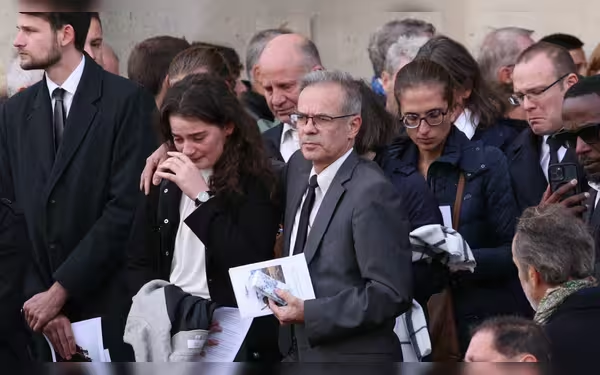Saturday, November 16, 2024 05:27 PM
Tragic Murder of Student Philippine Sparks Outrage in France
- 19-year-old student Philippine brutally murdered in Paris.
- Moroccan national identified as prime suspect in the case.
- Calls for stricter immigration laws intensify after the incident.
 Image Credits: arabnewspk
Image Credits: arabnewspkThe murder of 19-year-old Philippine in Paris ignites outrage and debate over immigration policies and public safety in France.
In a tragic incident that has shocked the nation, nearly 3,000 people gathered in Versailles, France, to pay their final respects to a 19-year-old student named Philippine, who was brutally raped and murdered. This heartbreaking case has ignited a fierce debate in France regarding migration policies, especially after a Moroccan national was identified as the prime suspect in this heinous crime. Philippine's body was discovered half-buried in a park in western Paris, prompting widespread outrage and calls for stricter immigration controls.
The suspect, a 22-year-old Moroccan man, was apprehended in Geneva and is expected to be extradited to France. Authorities revealed that he had a troubling history, having been previously convicted of rape and was under an expulsion order at the time of the incident. This revelation has raised serious questions about the effectiveness of the current immigration system in France.
During the funeral service held at Saint-Louis Cathedral, mourners filled the church, with many waiting outside to honor Philippine's memory. A 15-year-old girl, who attended the service, expressed her feelings, stating, "I thought it was important to come here to reflect and pay my respects." Her mother, Anouck B., echoed this sentiment, emphasizing the collective grief felt by the community, saying, "It was important to come and support the whole family." Such expressions of solidarity highlight the profound impact this tragedy has had on the local community.
French President Emmanuel Macron, while visiting Montreal, condemned the murder as "a heinous and atrocious crime," stressing the need for better public protection. In response to the growing concerns, conservative interior minister Bruno Retailleau has pledged to reform immigration laws to prevent similar incidents in the future.
The circumstances surrounding the suspect's release from detention have also come under scrutiny. After serving a sentence for a previous rape committed when he was a minor, he was released in June and placed under conditions that required him to report regularly to authorities. However, critics argue that these measures were insufficient to prevent this tragic outcome.
In the wake of Philippine's murder, right-wing politicians have called for stricter enforcement of deportation orders, questioning how many more tragedies France must endure before action is taken. Jordan Bardella, leader of the far-right National Rally, posed a poignant question on social media, asking, "How many tragedies will France endure before our leaders react?" This sentiment reflects a growing frustration among citizens regarding the perceived inadequacies of the government in handling immigration issues.
Conversely, some rights groups and left-wing activists have urged a shift in focus from immigration to the broader issue of "feminicide," emphasizing that misogyny is a significant factor in such violent acts. The women's rights group CIDFF stated, "Misogyny kills. Let’s not have the wrong debate," highlighting the need for a more nuanced discussion about violence against women.
This tragic event serves as a stark reminder of the complexities surrounding issues of immigration, crime, and gender-based violence. As France grapples with these challenges, it is crucial for society to engage in meaningful dialogue that addresses the root causes of such violence while ensuring the safety and security of all its citizens. The loss of young lives like Philippine's should not be in vain; rather, it should inspire a collective commitment to fostering a safer and more just society for everyone.













